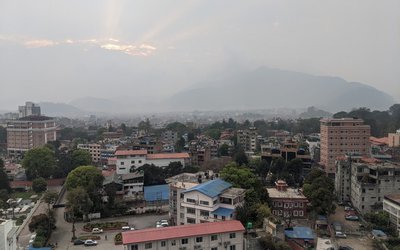Despite its participation in all the previous COPs, the COP 17 is going to be different for Nepal as it has to raise the issues faced by the Least Developed Countries as well as projecting the issues faced by the mountain countries.
At a time when there are wide differences between developed and developing countries like G77+ China and Least Developed Countries over the issue of funding for mitigation as well as the funding for adaptation, Nepal’s effective leadership will be sought by all.
The negotiations to find a global solution to the problems of climate change, primarily under the umbrella of the United Nations Framework Convention on Climate Change (UNFCCC) process, have yielded little. The last two annual sessions (called Conferences of the Parties, or COPs) agreed on vague generalities but essentially postponed resolving disputed details. Even the biggest boosters of the process hold out little hope for concrete achievements at the next COP in Durban, South Africa, which will begin in late November.UNFCCC negotiations involve a bigger basket of issues than most multinational talks -- including weaning whole economies off coal and oil, protecting disappearing forests, saving the small island states that are likely to be underwater within a few decades, and managing all the related costs. They are also an inclusive process, involving 194 countries -- polluters, victims and everyone in-between -- all of which officially have equal weight in the proceedings. Given the urgency of the issue and the glacial pace of progress, there may be reason to consider alternatives.
The 1997 Kyoto Protocol, rejected by the United States, put flesh on the UNFCCC's bones. Annex I countries -- industrialized countries that were OECD members in 1992, plus former Soviet bloc economies in transition -- agreed to emissions reduction targets. Developing countries (non-Annex I nations) -- China and India, for example -- were held to more limited obligations. And all were allowed to meet their targets in any way they wanted.
In 2009, COP might have been a chance to start anew. For the first time, a climate conference attracted world leaders, who were able to conclude an accord to hold global temperature within two degrees Celsius and create a system of voluntary reduction pledges in COP 2009.
The COP in Durban this fall will have to consider the future of the Kyoto Protocol, which by its own terms ends its "first commitment period" in 2012. It is also tasked with filling in the missing details from the previous rounds of negotiations and reconsidering the differentiation between Annex I and non-Annex I countries. And it must do all of this -- as in any negotiation under UN auspices -- under ground rules where any single nation might block the will of all the others.
The UNFCCC was opened for signature on May 9, 1992, after an Intergovernmental Negotiating Committee produced the text of the Framework Convention as a report following its meeting in New York from April 30 to May 9, 1992. It entered into force on March 21, 1994. As of May 2011, UNFCCC has 194 parties.
One of its first tasks was to establish national greenhouse gas inventories of greenhouse gas (GHG) emissions and removals, which were used to create the 1990 benchmark levels for accession of Annex I countries to the Kyoto Protocol and for the commitment of those countries to GHG reductions. Updated inventories must be regularly submitted by Annex I countries.
The parties to the convention have met annually from 1995 in Conferences of the Parties (COP) to assess progress in dealing with climate change. In 1997, the Kyoto Protocol was concluded and it established legally binding obligations for developed countries to reduce their greenhouse gas emissions.
Conferences of the Parties
The first few meetings of the Conference of Parties were held in Berlin in 1995, Geneva in 1996, Kyoto in 1997, Buenos Aires in 1998, Bonn in 1999, The Hague in 2000, and Bonn Germany in 2001. The meetings took place in 2002 in New Delhi, India, and in 2003 in Milan, Italy. Buneos Aires, Nairobi of Kenya, Bali Indonesia, Poznan, and Poland hosted the meetings before the 2009 Copenhagen Denmark, and 2010 Cancun Mexico meets.
The United Nations Framework Convention on Climate Change (UNFCCC) was opened for signature at the 1992 United Nations Conference on Environment and Development (UNCED) in Rio de Janeiro (known by its popular title, the Earth Summit). On June 12, 1992, 154 nations signed the UNFCCC, that upon ratification committed signatories' governments to a voluntary "non-binding aim" to reduce atmospheric concentrations of greenhouse gases with the goal of "preventing dangerous anthropogenic interference with Earth's climate system.”
Nepal has been participating in UNFCCC meets since 1995 but there were no records about Nepal’s participation and stands up to COP 13 which was held in Bali in 2007. Nepalese officials started taking part in UNFCC Conference of Party since Bali which was known for its Bali Action Plan in the context of implementation of UNFCC resolution. Bali Action Plan focuses basically on four pillars that include mitigation, adaptation, financing and capacity building and transfer of technology.
Nepal signed the declaration on 12 June 1992 and ratified it in 2 May 1994 while bringing it into force in 31 July 1994.
- TANAHU HYDROPOWER PROEJCT: A Significant Achievement
- Apr 15, 2024
- AMBASSADOR HANAN GODAR: Sharing Pain With A Nepali Family
- Mar 30, 2024
- VISIT OF KfW AND EIB TO NEPAL : Mission Matters
- Mar 25, 2024
- NEPAL BRITAIN SOCIETY: Pratima Pande's Leadership
- Mar 24, 2024
- NEPAL ARMY DAY: Time To Recall Glory
- Mar 15, 2024
















